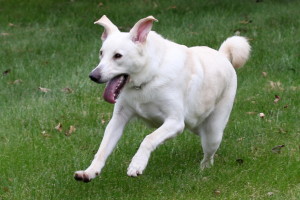
After such a rough winter, we’re all ready for a little warm weather and sunshine. How nice to see the grass trying to sprout and trees starting to bud. In the South, we start spring earlier than other regions of the country. On the short walk from my car to the hospital door, I can smell the Bradford Pear and Azalea blossoms. How sweet it is…until the first sneeze!
Inhalant Allergy Symptoms
My allergies kick in this time every year and, like many allergy sufferers, my nose runs and my eyes itch. And after I enter the clinic, I see canine patients that have the same symptoms that I do, plus more! Yes, our dogs have inhalant allergies just like we do.
The human response to inhaling pollen results in allergic symptoms that are mostly confined to the respiratory tract: We sneeze and cough, our eyes are runny and itchy, and our throats are scratchy. Dogs experience the same symptoms, but they may itch in other areas of the body, too. So, our poor dogs may have a harder time with allergy season than we do.
The Cause of Allergy Symptoms
Most inhalant allergies result in the release of chemicals called histamines. That’s why we feel better when we take an anti-histamine medication. Humans release histamines predominantly in and around the respiratory tract resulting in the traditional itchy eyes, runny nose, scratchy throat symptoms. Dogs, on the other hand, release histamine in a more general way so they tend to itch all over their bodies.
Signs of Allergies in Dogs
If your dog does any of the following things, he or she may have an inhalant allergy:
- Licks or chews at feet
- Rubs face with paws or rubs face on the ground, carpet, etc.
- Has patches of hair loss or infected skin
- Scratches back or belly
- Scratches at ears or has recurrent ear infections
Make note of when these signs occur so that your dog’s personal allergy season can be narrowed down, and take your dog to see his veterinarian.
Allergy Treatment
Like people, dogs can often find allergy relief by taking oral anti-histamines, but some dogs need more help. Frequent bathing in hypoallergenic shampoos may sooth irritated skin. Topical steroid sprays may also decrease skin inflammation. Ear infections can be treated with medications applied to the ear canal. Skin infections that often accompany allergies can be treated with antibiotics. Fatty acid supplements can be added to the diet to improve the overall quality of the dog’s coat. Newer prescription medications that target allergies and are safer than oral steroids are now available. Also, dogs can receive desensitization therapy with a series of allergy “shots” much like people do. This process takes time and doesn’t provide immediate relief, but it can also be a good long-term solution.
Your veterinarian can choose the most effective regimen for your dog’s particular allergic condition. With the constant guidance of your veterinarian, you can help your dog weather the allergy season safely and comfortably.
Decreasing Exposure to Allergens
Inhalant allergies mean that your dog inhales the pollen. We can’t stop our dogs from breathing, so how can we decrease their exposure to allergens? Here are some ways to minimize your dog’s contact with allergens:
- Walk your dog early in the morning when dew is still on the grass. Wet grass and trees release less pollen than dry ones.
- Wipe your dogs feet before he comes inside. Leave a container of baby wipes by the back door to make this easier. You won’t remove all the pollen, but can certainly decrease the amount he carries inside.
- Change air filters in the house regularly
- Don’t vacuum when the dog is in the room; you can really stir up allergens this way.
- Wash your pet’s bedding in hot water weekly.
- Keep your dog inside when you mow the grass.
And speaking of grass, I am ready to see the green stuff replace the brown stuff in my yard! I am ready for spring even though my allergies are not. Call your veterinarian to help your dog enjoy spring by keeping his allergies in check.
